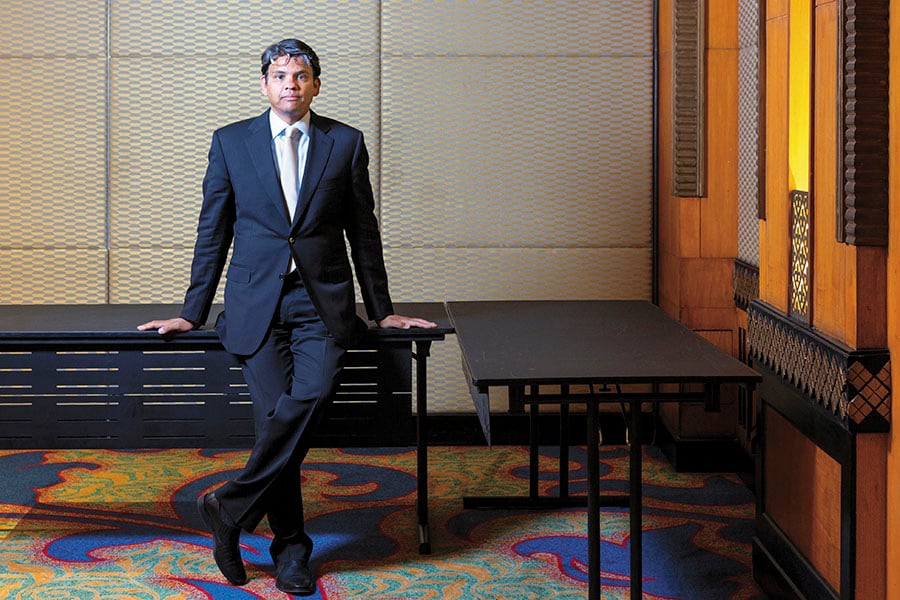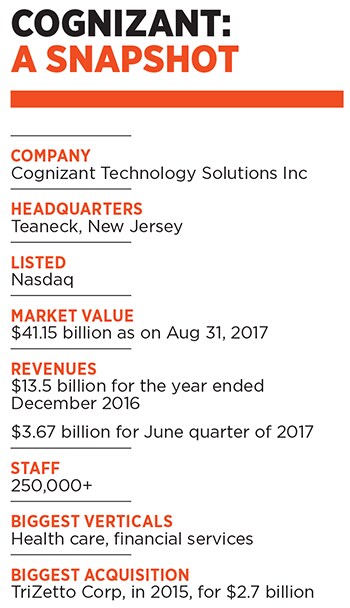The best days of IT are still ahead: Cognizant Technology Solutions CEO
The future of IT services companies remain bright as they evolve into the very basis of competitive advantage for their clients, says CEO Francisco D'Souza


 Francisco D’Souza is starting his second decade as the CEO of Cognizant Technology Solutions
Francisco D’Souza is starting his second decade as the CEO of Cognizant Technology Solutions
Image: Madhu Kapparath
Francisco D’Souza, who helped start Cognizant Technology Solutions in 1994, has been its CEO for over 10 years. He continues to shepherd the company based in Teaneck, New Jersey, as it undergoes structural changes in the digital era. This includes the acquisition of US-based TriZetto Corp two years ago, which D’Souza, 49, says has helped Cognizant’s health care unit touch 160 million Americans in some way. The $2.7 billion buy is an example of how technology’s rapid evolution is compelling IT services businesses to transform into strong intellectual property-led business advisors and tech providers rolled into one, he tells Forbes India. He also expects to accelerate the pace of acquisitions at the Nasdaq-listed Cognizant. Edited excerpts:
Q. This year, you entered your second decade as CEO of Cognizant. What strikes you about the current phase of change in technology?
The overriding thought that comes to mind is just how much innovation we’ve seen. About 24 years ago, when we started Cognizant, technology was largely a back-office function. It’s gone from there to becoming the very basis of competitive advantage for many of the businesses we serve and because of this evolution, the best days are still ahead of us. If you think of the great digital buildout that’s happening, I think Cognizant, and the [tech] industry in general, is still in the early innings. The next years will see digital technology being deployed more broadly in all industries and in many more companies. And digital isn’t just one thing, it’s many different technologies—social, cloud, mobile, analytics, blockchain, AI, IoT and so on.
Q. What has changed more recently, and how are you preparing to remain a relevant vendor to your clients?
Until a few years ago, there was a sense among our clients that digital technologies would be fundamental to their future. But the patterns of how, why and where were less clear. So we saw a lot of small pilots, testing and iterating. In the last couple of years, we’ve seen that change—the patterns are becoming clear, digital technologies are becoming more mainstream and we see clients adopting it at scale.
To do digital at scale, our clients are having to change their business, operations and technology models simultaneously. That is at the core of today’s change. One of the most foundational changes that we’ve made at Cognizant over the last two years is to realign our delivery capabilities across all of our business segments along three areas—digital business, digital operations, and digital systems and technologies. Each focussed on transformation in that area.
Q. What did this entail?
Even before the [acceleration of] digital, Cognizant has had a diverse set of people. In addition to engineers and MBAs, we’ve got doctors, nurses and chartered accountants. It became clear that there were some new capabilities that we needed. The main ones—and we built significant capabilities around the world—were design, data science and a small group of very high-impact sociologists and anthropologists, who look at human factors.
Business model transformation is an iterative process and one that takes in people with a broad set of skills and talents—technologists, consultants, data scientists, designers, industry experts—who have to be collocated with the client.
They then go through the iterative process of discovering market opportunities, course correcting, prototyping and so on. To facilitate that, we have built what we call ‘collaboratories’ around the world, which are co-innovation spaces for clients and Cognizant teams. Q. How is the work and the composition of your staff changing?
Q. How is the work and the composition of your staff changing?
I don’t think the global distribution of our workforce has changed or will change substantially in terms of where people are. There haven’t been any big shifts, and I don’t forecast any either. India is far and away our largest location, and it continues to be our largest recruiting base.
In the digital world, design, data science and human factors become more important and our specialists need to be close to the clients, and we’ve built them close to the clients. Some of these specialists are in India as well to serve clients here and in Asia, but I would say the bulk of them are close to the clients. The overall mix of work and the distribution across centres, however, is not meaningfully different from earlier.
Q. And you will accelerate acquisitions?
We had said earlier this year that we intend to accelerate the pace of acquisitions and you’ll see us do that. It’s important right now as we continue to make the shift to digital. With the exception of our 2015 acquisition of TriZetto Corp, most have been tuck-in acquisitions and that will continue to be the primary approach. TriZetto established us strongly in the health care space with a strong set of intellectual property (IP) and software. We will continue to build our platforms and software, both in-house and via purchases.
Q. How can we illustrate the rise of digital services?
Take health care. A lot of the work is underpinned by TriZetto’s IP. In other industries like insurance, retail and CPG [consumer packaged goods], we also have our own IP that is starting to contribute to overall revenue. If, broadly, digital is seen as [new] software plus services, over 25 percent of Cognizant’s revenues come from it as of the quarter ended June 30, 2017. Apart from that, we have platforms from TriZetto and others.
Q. How are the new services different in terms of traditional billing for employees assigned to a project?
In the platform work, we are focusing a lot on what we call business-process-as-a-service (BPaaS). It combines cloud-based infrastructure, software and people as a stack on a per-transaction billing. For instance, a health insurer who signs up with us for the BPaaS model will pay us on a per-member-per-month basis. And there is a menu of services.
Take claims processing, for instance. They get the software, the underlying cloud infrastructure and the people who will actually do the claims processing [a kind of IT-in-a-box].
It gives clients flexibility, and for us the pricing is not based on people but based on some output or delivery. Much of our new kinds of work is on some kind of BPaaS model.
Q. As you evolve, what concerns you the most?
In the past, there were periods of rapid advances followed by longer stretches during which new technologies were widely deployed. With digital, technology is evolving on multiple fronts and at a much faster pace. The ability of a company to sense and respond quickly at this pace is new. It’s particularly important now, and one that we can’t miss.
Part of the challenge right now is that just as there are technologies that we can see today that are clearly important, there are emerging technologies on the horizon that may or may not become important. That sense-and-respond mechanism is critical at this point in time. I spend a lot of time making sure that we keep one foot in the present and one foot in the future, ensuring that we don’t miss an important trend.
Q. Three to five years from now, what kind of a Cognizant will we see?
As the world becomes more tech intensive, as tech becomes more complex and the ecosystem and range of available tech broadens, the need for companies like ours in advising our clients on the right technology will only become more critical. Our business will evolve—they will continue to be large services businesses, but with strong tech and IP underpinnings.
On AI [artificial intelligence], we are still in very early stages from a large scale deployment perspective. We think about AI for our clients— we are already seeing that much of the work that we do will have some AI components—it will give us the opportunity to automate the work done today manually by humans. It will serve to amplify, make people more productive and more efficient. I’ve heard of predictions and fears that AI will substantially reduce employment in the services industry. I don’t think that will be the case.
First Published: Sep 25, 2017, 06:50
Subscribe Now